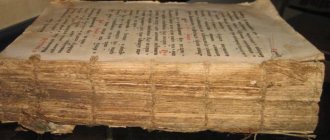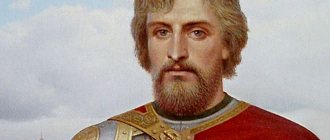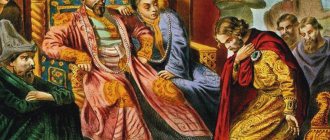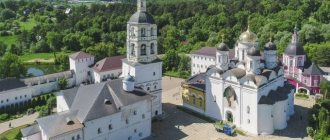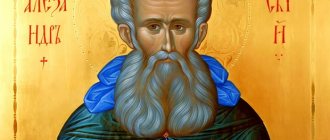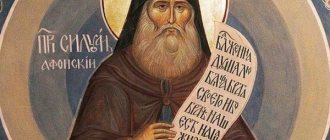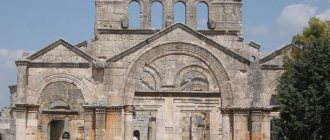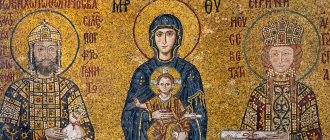| St. Alexander of Constantinople |
Alexander
(+ c. 337), Archbishop of Constantinople, saint.
About the same name St.
abbot, see Alexander, head of the monastery of the Undying Commemoration of August 30 [1] and in the Cathedral of the Constantinople Saints (Greek)
He headed the Byzantine department in the years when Equal-to-the-Apostles Tsar Constantine I the Great chose this city as the site of the new capital of the Roman Empire. According to some sources, he ruled the local diocese from 313/314 [2]. There is an opinion that he was initially the chorebishop of Saint Mitrofan of Constantinople, who sent him, because of his old age, as a representative to the First Ecumenical Council in Nicaea in 325 [3], and before his death he bequeathed the election of Alexander to the throne of Constantinople [4].
Saint Alexander, who, according to historians, had undeniable moral authority among the population of Byzantium, became one of the most ardent opponents of the Arian heresy that was then spreading. Before the First Ecumenical Council, he received from Alexander of Alexandria a large message denouncing Arius [5].
The historian Sozomen talks about how Emperor Constantine ordered a public debate between the bishop and pagan philosophers who reproached the emperor for changing his religion. Alexander, although not skilled in verbal debate, could not refuse the emperor. When everyone had gathered and one of the philosophers began his speech, Alexander, in the name of Jesus Christ, forbade him to continue, and he, stumbling, could not utter another word. When the pagan expressed with signs his confession of error and conviction of the correctness of Christian teaching, speech returned to him and he believed in Christ with many other philosophers.
After the consecration of the new capital, Saint Alexander became the first bishop of Constantinople - from May 11, 330.
A few years later, Eusebius of Nicomedia, who was very influential at court, gave him a choice: either enter into communication with Arius, or resign from the episcopal rank. Without protesting, Alexander retired to the temple and spent many nights there in prayer. In the end, the emperor himself ordered him to submit to the persuasion of Eusebius. The next day, Sunday, Arius was to be solemnly admitted to the Divine Liturgy. The saint began to pray even more zealously, asking God to show him on whose side the truth is, through the death of the erring one. At dawn it became known that Arius had died on the way to the temple.
Alexander died, probably soon after Emperor Constantine (+ 337), leaving Saint Paul as his successor. The saint reposed at the age of 98 [6].
Life of Saint Alexander of Constantinople
It is not known who the parents of Alexander of Constantinople were; the life of the saint only indicates the fact that the future ascetic was born in Asia, and went to Constantinople to receive an education. After completing his studies, he spent some time in military service, but such activities weighed heavily on him and haunted his soul.
For a long time he was attracted by another calling - hermitage and service to the Lord. Therefore, after some time he goes to the desert. There, in one of the Syrian monasteries, which was headed at that time by Abbot Ilya, he took monastic vows and forever renounced worldly pleasures. Over the course of four long years, he proved by deeds that he was worthy to take on the ministry of desert life, spending all his time in prayer and fasting.
Seeing that the young monk was truly devoted to the Almighty with all his soul and was ready for the hermit’s feat, the abbot of the monastery blessed him to work and released him into the desert. When leaving the monastery, Alexander did not take anything with him; the only item he took from the monastery was the Gospel. The monk spent almost seven years in the desert, laboring in prayer and pacifying his flesh through fasting. After this time, he heard the voice of the Lord, which told him to leave his desert habitation and go preach the Word of God to the pagans.
Thanks to his eloquence and strong faith, Saint Alexander of Constantinople converted the mayor Rabulus to the Christian faith, who was subsequently awarded the priesthood and for 30 years ruled the episcopal see, which was located in the city of Edessa. Looking at their mayor, all the residents repented of their sins and accepted holy water Baptism. After this, they collected all the idols that they had previously worshiped and burned them in the city square.
Having strengthened the converts in the Christian faith, Saint Alexander again headed into the desert. There he accidentally came across a cave of robbers, deciding to spend the night there. When the owners of the cave arrived, the saint was not afraid, but began to tell them about Christ’s love and the need for repentance in order to have eternal life. The Lord was with Alexander and put the necessary words into his mouth, so all the robbers turned to the Lord and repented of their sins. After receiving Baptism, they turned their den into a monastery, and began a new life of fasting and prayer.
The Monk Alexander of Constantinople placed an abbot over them, and he himself went even further into the desert area, where he spent several years in complete solitude, offering prayers to the Lord. However, people heard about the pious servant and began to flock from all cities to Alexander. Soon about 400 monks settled next to them, and then the saint decided to found a monastery on this place.
He was eager to arrange worship in this monastery in such a way that the glory of the Lord would constantly pour out of it, so he began to pray and ask God for revelation. After some time, the Almighty answered the requests of his servant and gave instructions to introduce a special order in the monastery.
All the monks were divided into 24 guards, thus changing every hour, they constantly sang the psalms of David, bringing glory to the Lord. Because of this feature, the monastery was popularly called “Unsleepless”. For 20 years, Alexander ruled the monastery, after which he left a disciple to manage the monastery in his place, and he and several monks set off again to preach the Word of God to the pagans.
Having completed his missionary journey, the saint settled in Antioch, where he built a church, a hospital and a hospice thanks to funds received from the residents. Alexander spent the last years of his life in the Constantinople monastery and died in 430.
Miracles and help
Already during his lifetime, through his prayer, Alexander performed inexplicable miracles. One of the striking examples was the debate between pagan philosophers and Alexander, organized by the Byzantine emperor Constantine, who was reproached for changing religion in the state. The philosopher began to speak, but Alexander, in the name of Christ, forbade him to continue. As a result, he could no longer utter a single word. Only by admitting that he was wrong did he speak again and believe in God.
Important! Prayer to the saint helps to collect thoughts and get rid of distraction. Before starting to read long akathists or psalms, it is advised to turn to St. Alexander with a request to give strength and inspiration to read prayers.
Prayer text
O sacred head, reverend father, most blessed Abvo Alexander, do not forget your poor to the end, but always remember us in your holy and auspicious prayers to God: remember your flock, which you yourself shepherded, and do not forget to visit your children, pray for us, Holy Father, for your spiritual children, for you have boldness towards the Heavenly King; do not keep silent to the Lord for us, and do not despise us, who honor you with faith and love; remember us unworthy at the Throne of the Almighty, and do not stop praying for us to Christ God, for the grace has been given to you to pray for us. We do not imagine that you are dead: even if you passed away from us in body, but remained alive even after death, do not depart from us in spirit, preserving us from the arrows of the enemy and all the charms of demons and the wiles of the devil, our good shepherd, even if the relics of your cancer are always visible before our eyes, but your holy soul with the angelic hosts, with the disembodied faces, with the heavenly powers, standing at the Throne of the Almighty, worthily rejoices, knowing that you are truly alive after death, we fall down to you and we pray to you: pray for us to Almighty God, for the benefit of our souls, and ask us time for repentance, so that we may pass from earth to heaven without restraint, and from bitter ordeals, demons of air princes and from eternal torment, may we be delivered from eternal torment, and may we be heirs of the Heavenly Kingdom with all the righteous , from all eternity have pleased our Lord Jesus Christ: To Him is due all glory, honor and worship, with His Beginning Father, and with His Most Holy and Good and Life-Giving Spirit, now and ever and unto ages of ages. Amen.
Reverence
Saint Gregory the Theologian already mentioned Saint Alexander in his eulogy to the people of Constantinople.
In the iconographic tradition, Saint Alexander is depicted as a saint in an omophorion, with the Gospel in his hands. This is how he appears in the deacon of the Church of St. Sophia in Ohrid, Macedonia (1050s); on the Menaion icon for August (beginning of the 17th century, TsAK MDA); in the wall minology of the Church of St. Nicholas in Pelinov (full size, 1717-1718).
In 1892, a church was built in Moscow in the name of Alexander, Archbishop of Constantinople, at the shelter of Basil-Caesarean guardianship, which has survived to this day (Butyrsky Val, 26).
Notes[edit]
- Smith 1911 citing Theodoret Hist.
I. 19harvnb error: no target: CITEREFSmith1911 (help) - Kazhdan Alexander; Talbot, Alice-Mary (01/01/2005). "Patriarchate of Constantinople". Oxford Dictionary of Byzantium
. Oxford University Press. ISBN 978-0-19-504652-6. Retrieved July 25, 2022. - See Canon III, First Council of Constantinople, 359 AD.
- Smith 1911 citing Socrates Scholasticus Hist.
II.
6; Sozomen Hist.
iii. 3harvnb error: no target: CITEREFSmith1911 (help) - Smith 1911 citing Gregory Nazianzus, Oration 27.
harvnb error: no target: CITEREFSmith1911 (help) - Smith 1911 quotes Epiphanius of Cyprus, Adv. Haer
. lxix. 10harvnb error: no target: CITEREFSmith1911 (help) - Smith 1911 citing Theodoret, Hist.
I.
3, Wed. Phil.
12harvnb error: no target: CITEREFSmith1911 (help) - Smith 1911 citing Theodoret, op. op.
I. 4harvnb error: no target: CITEREFSmith1911 (help) - Smith 1911 cites Sozomen, op. op.
II. 29harvnb error: no target: CITEREFSmith1911 (help) - Smith 1911 quotes Athanasius of Alexandria Ep. ad Serap.
;
Rufinus, Hist.
i.harvnb error: no target: CITEREFSmith1911 (help) - Smith 1911 citing Socrates Scholasticus, op. op.
I. 37harvnb error: no target: CITEREFSmith1911 (help) - Smith 1911 citing Socrates Scholasticus, op. op.
II.
6; Theodoret, op. op.
I. 19harvnb error: no target: CITEREFSmith1911 (help)
Arian controversy[edit]
When the Arian Controversy began, Alexander, Patriarch of Alexandria, asked him for cooperation in the fight against what he considered heresy. [8] According to most sources, Alexander of Constantinople attended the First Council of Nicaea [9] as Mitrophan's deputy, although some sources claim that Mitrophan (who was 117 years old at the time) attended the council in person. . At the council, Arius and his teaching were condemned.
Arius later wished to be readmitted into ecclesiastical communion. The Roman Emperor Constantine I, being convinced of Eusebian, commanded Alexander to formally receive back Arius. [10] According to Socrates the Scholasticus, Arius did not actually repent of his heresy, but was prevaricating, and Bishop Alexander knew about it. [11] Alexander, although threatened with deposition and exile by the Eusebians, persisted in his refusal to accept Arius back into the Church and locked himself in the Church of St. Irene (which was the cathedral of Constantinople at the time) in fervent prayer that God would take him from this world rather than was forced to bring back into fellowship someone who he feared was only feigning repentance. It so happened that Arius died on the way to church before he was again received into the sacrament.
How does the icon of St. Alexander of Constantinople help?
Through the icons of His saints, the Lord sends us what we ask for, useful for our souls. The saints, just like us, who have walked the earthly path, know our needs. They experienced the same experiences, overcame similar earthly difficulties. When we ask a saint for intercession, we ask that he convey our prayer to God and that the saint’s prayers will be heard faster than our sincere appeal to them. The icon of St. Alexander of Constantinople helps to establish a prayer connection with the patron saint. Having before us the visual image of Saint Alexander, our prayer is not dissipated into empty ideas and dreams. And according to the faith of the one who asks, the Lord, through His saints, gives us what we ask.
They pray to St. Alexander of Constantinople:
— About strengthening faith — About help in organizing earthly affairs — About healing of bodily and spiritual infirmities.
Truly wonderful is God in His saints! Dear believers, brothers and sisters! Do not doubt the help of St. Alexander! Open your heart to him in sincere prayer and he will hear us, heal spiritual and physical infirmities, and help in the successful arrangement of earthly affairs.
Do not forget that in order for a miracle to happen, we ourselves must take care: regularly, with attention, read the prayer, do deeds of faith and love. And don’t forget to give thanks: to thank all the people sent to us by the grace of God to solve our life’s troubles, who shared our joy and sorrow. To thank the Saint, whose prayerful support our heart yearned for, because how many people pray to him for help, but he heard and helped us too. And most importantly, thank the Lord for His boundless love for mankind. He gave the world His saints and every second helps us, people who hope for His great mercies.
Everything in the world happens according to the wise providence of God. Difficulties and sorrows, success and joys. Through earthly trials the Lord strengthens us. By helping each other, praying to the heavenly saints, we are more firmly united in the One Church of Christ. And we believe that Saint Alexander will hear all our prayers and show us the boundless mercy of our Lord Jesus Christ. Thank God for everything!
Prayers
Troparion of Saints, Archbishops of Constantinople Alexander, John and Paul the New, tone 3
, from the Greek Menaion [7]
The mysteries of heaven have appeared, / the divine revealer has appeared to the world, / the Church of Christ has fallen to God, / sacred Alexander, champion of the Trinity, / John, the most glorious, brought up by grace nny,/ and Paul, above the priests.// We also praise you
.
Kontakion, tone 3
Today let us all praise the Trinity of the holy hierarchs/ with sacred songs./ For these, like the builders of the Ineffable,/ give ever-flowing grace to those who cry:/ O, the all-blessed Alexander,/ and John with Paul, rejoice
.
Memorial Days
The memory of the saint is revered on March 8 and July 16.
In historical descriptions, Alexander of Constantinople is presented as a man of high morality, possessing unquestioned authority among the Byzantines. He headed the Byzantine department during the reign of Tsar Constantine I the Great.
On a note! The monk became the first bishop of consecrated Constantinople. This man throughout his life demonstrated unshakable faith in Jesus Christ and, through his own example of asceticism, proved that God’s providence will never leave a true believer Christian in trouble.
Notes
- Smith 1911 harvnb error: no target: CITEREFSmith1911 (help) citing Theodoret Hist.
I. 19 - Kazhdan Alexander; Talbot, Alice-Mary (01/01/2005). "Patriarchate of Constantinople." Oxford Dictionary of Byzantium
. Oxford University Press. ISBN 978-0-19-504652-6. Received 2018-07-25. - See Canon iii, First Council of Constantinople, 359 AD.
- Smith 1911 harvnb error: no target: CITEREFSmith1911 (help) citing Socrates Scholasticus Hist.
II.
6; Sozomen Hist.
iii. 3 - Smith 1911 harvnb error: no target: CITEREFSmith1911 (help) quoting Gregory of Nazianzus, Oration 27
- Smith 1911 harvnb error: no target: CITEREFSmith1911 (help) citing Epiphanius of Cyprus, Adv.
Haer . lxix. 10 - Smith 1911 harvnb error: no target: CITEREFSmith1911 (help) citing Theodoret, Hist.
I.
3, Wed. Phil.
12 - Smith 1911 harvnb error: no target: CITEREFSmith1911 (help) citing Theodoret, op.
op. I. 4 - Smith 1911 harvnb error: no target: CITEREFSmith1911 (help) citing Sozomen, op.
op. II. 29 - Smith 1911 harvnb error: no target: CITEREFSmith1911 (help) citing Athanasius of Alexandria Ep.
ad Serap. ;
Rufinus, Hist.
I. - Smith 1911 harvnb error: no target: CITEREFSmith1911 (help) quoting Socrates Scholasticus, op.
op. I. 37 - Smith 1911 harvnb error: no target: CITEREFSmith1911 (help) quoting Socrates Scholasticus, op.
op. II.
6; Theodoret, op.
op. I. 19
Sources, literature
- BHG
, N 1279-1280. - Alexander of Alexandria, St., “Message to Alexander of Constantinople,” DVS
, St. Petersburg, 1994, vol. 1, 18-29. - Athanasius the Great, St., “Epistle to Brother Serapion,” ch. 2-4, Creations
, vol. 2, 99-102. - Theodoret, blessed, Church.
ist. , I 3-4, 14, 19. - Sozomen, Church.
ist. , I 13, 18; II 29. - Gelasius Cyzicenus, Hist.
Concilii Nicaeni , II 27, 36,
PG
, 85, Col. 1241, 1312, 1344. - Socrates, Church.
ist. , I 37-38. - ActaSS.
, Jun., vol. 7, 71-84; Aug., vol. 6, 195-198. - Sergius (Spassky), Mesyatseslov
, vol. 3, 344. - Andrieu M. Alexandre (23), DHGE
, vol. 2, Col. 184-186. - LTK
, Bd. 1, Sp. 314. - ΘΗΕ
, vol. 2, Στλ. 107-108. - Grumel, Chronologie
, 434. - JSV.
, Aug., 518-530. - LCI
, Bd. 5, Sp. 86. - Hamman-McLean, Hallensleben. Plan 4. N 14.
- Mijoviě, Menolog
, 391. - Forty forties
, vol. 3, no. 55, 170-171.
Origins and early life[edit]
| This article may have to rewrite so that it meets Wikipedia's quality standards. |
Information from the Synaxarion mentions that Alexander was originally from Calabria in Italy, and his parents were George and Vryan. From a very early age he was given to God and remained in a monastery, where he cultivated virtue and became a good worker of God's commandments. He was granted divine visions, and for twenty days he fasted completely. But he also remained naked for four years and got into thousands of troubles due to Saracen attacks. So he lived for many years, traveling around Greece with his students Vitaly and Nikifor.
Alexander was elected vicar to help the elderly Bishop of Byzantium, Mitrofan. As a result, both Alexander and Mitrofan are considered the first bishop of Constantinople (both are also sometimes referred to as the first "patriarchs" of Constantinople, although the episcopal see had not yet been elevated to that rank). [3] Alexander served as bishop for about 23 years, until his death at the age of 73 in 337. [4] At the time of Mitrofan's death, he left in his will instructions to elect his governor to the throne of Constantinople. .
During his bishopric, Alexander debated with pagan philosophers and opposed heresies. He was highly praised by Gregory of Nazianzus [5] and Epiphanius of Cyprus. [6] Theodoret called him an "apostolic" bishop. [7]

